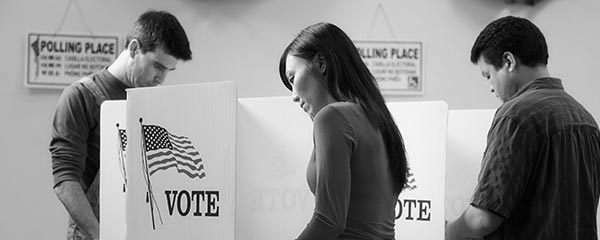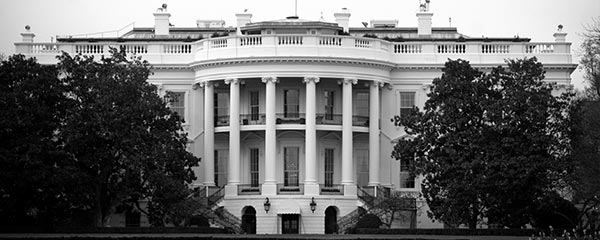Story Highlights
- Rating continues to show record party polarization
- Satisfaction with state of nation climbs to 15-year high
- Approval rating of Congress stable at 23%
WASHINGTON, D.C. -- President Donald Trump's job approval remains elevated at 49% in the latest Gallup poll, the same as in the previous poll and up five points from an early January poll conducted before Trump was acquitted by the Senate in his impeachment trial.
As in the prior poll, conducted Jan. 16-29, the approval rating from the Feb. 3-16 poll reflects record polarization for a single Gallup poll, with 87 percentage points separating the ratings of Republicans (93%) and Democrats (6%). Forty-three percent of independents approve of Trump, the highest rating for him among the group to date.
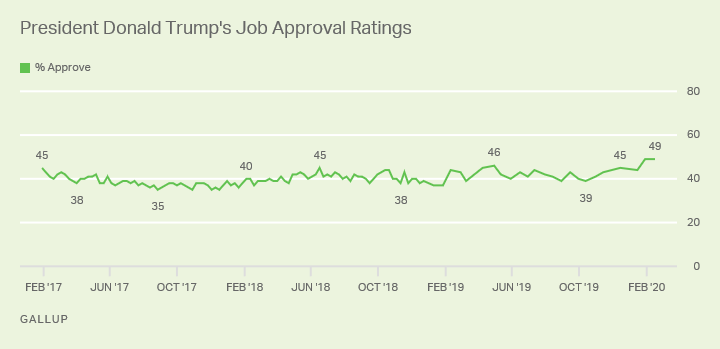
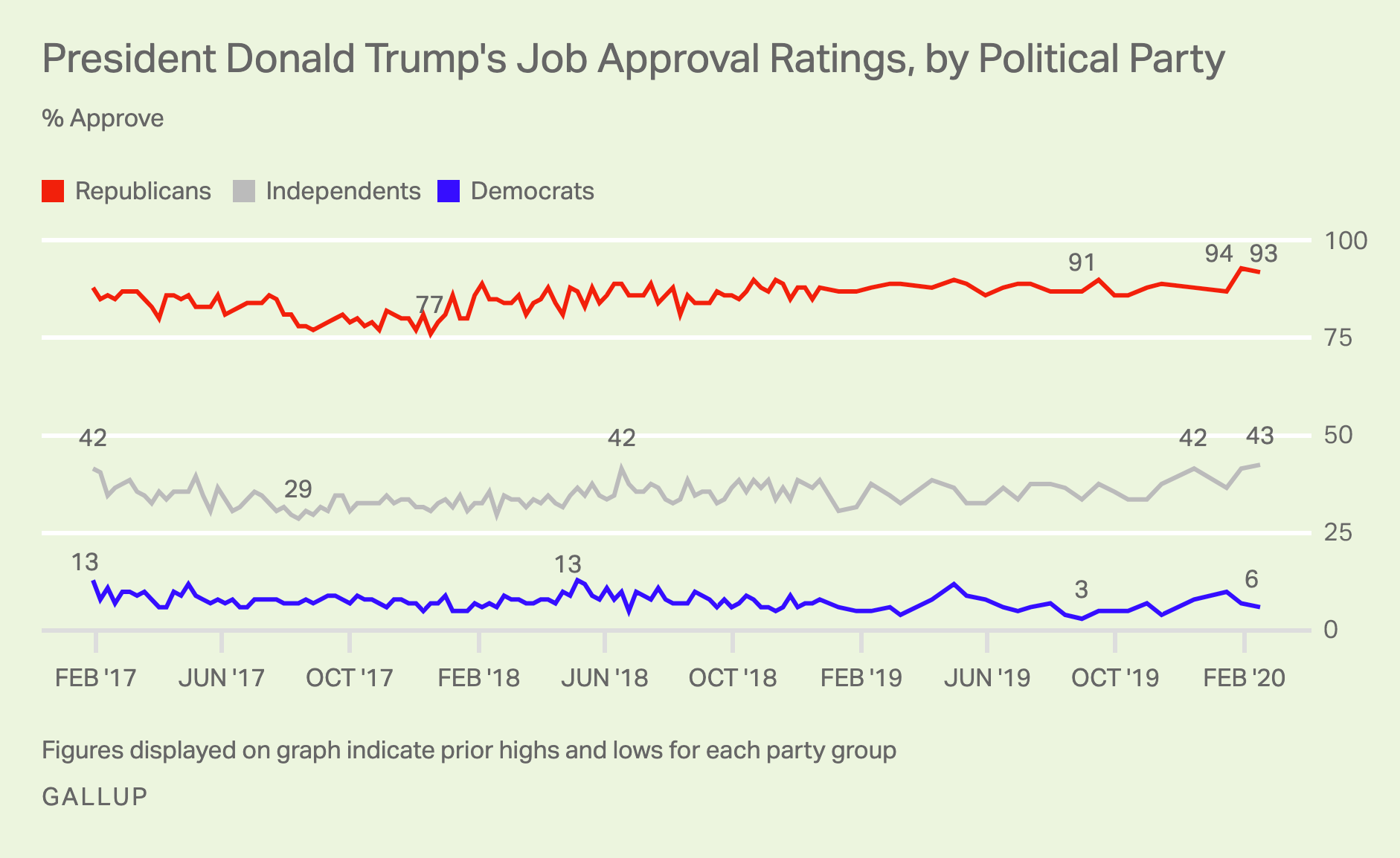
Trump's elevated job approval rating comes at a time when Americans are increasingly positive about the state of the nation. The percentage who are satisfied with the way things are going in the U.S. had already improved from 36% to 41% in a Jan. 3-16 poll, before the rise in Trump's job approval rating in late January. The latest survey finds a further increase in national satisfaction, with 45% now satisfied, the highest since February 2005.
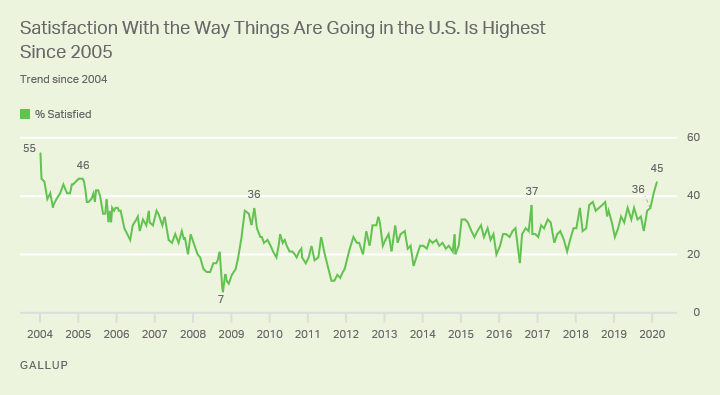
Republicans, whose satisfaction with the direction of the country has surged from 58% in December to 80% today, are entirely responsible for the increase in satisfaction. Independents' and Democrats' evaluations of the state of the nation have been steady in recent months.
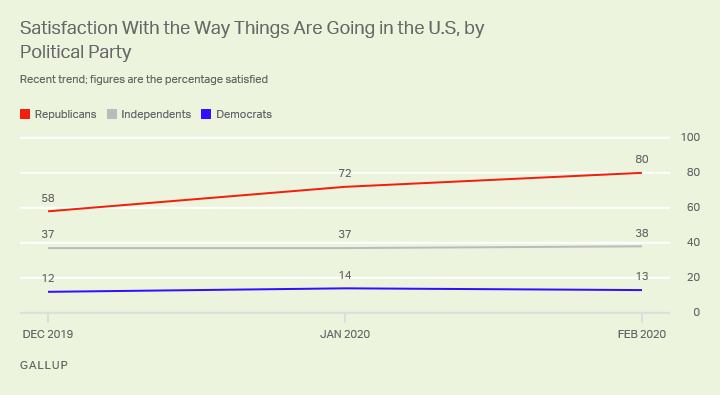
While Trump job approval and national satisfaction have improved since January, other measures are stable:
-
63% of U.S. adults rate current economic conditions as either excellent or good. Just 9% rate them as poor.
-
By 61% to 33%, Americans say the economy is getting better rather than worse.
-
Gallup's Economic Confidence Index, a summary of ratings of current conditions and whether the economy is getting better or worse, is +41. This is essentially the same as last month, but both readings represent a return to the prior high of +44 in October 2000.
-
23% of Americans approve of the job Congress is doing, matching January's reading, but down slightly from 27% in December.
Americans also continue to name the government as the most important problem facing the nation, with 32% doing so, one of the higher percentages mentioning the issue in Gallup's history. The highest was 35% in February 2019, around the time of the federal government shutdown.
Many of the problems with government that Americans cite in their answers to this open-ended question center on mentions of "President Trump," "Congress," and "The Democrats." But others list specific grievances with the government, such as a lack of bipartisanship. Forty percent of Democrats, 36% of Republicans and 26% of independents name the government as the most important problem.
The next-most-commonly cited problems are immigration (11%) and healthcare (10%).
Potential Explanations for Trump's Improved Job Score
Trump's approval rating may be higher because of the Senate's acquitting him in the impeachment trial. Bill Clinton's job approval ratings also were higher spanning the time between his impeachment in late 1998 and his acquittal in early 1999. Americans' generally positive and improved perceptions of the state of the nation are also likely a contributing factor. These factors may be driving Republicans' and independents' ratings of Trump higher, but not Democrats'.
Gallup has observed an increase in the percentage of Americans identifying as Republicans (32% in the past two surveys, up from 28% in the prior two surveys), along with a decline in the percentage identifying as independents (41%, down from 43%) and Democrats (27%, down from 28%).
While this could be attributable to sampling error, the fact that Trump's approval rating and Republican Party identification have been higher two surveys in a row makes that less likely.
It could also be evidence of a change in the respective percentages of partisans willing to participate in public opinion surveys at a time when political events may seem more favorable to Republicans than Democrats. This phenomenon, sometimes referred to as differential nonresponse, is difficult to demonstrate in random-digit-dial telephone surveys, in which the characteristics of nonrespondents are not known. Should it be the operative factor, one remedy would be to weight the sample to some prior estimate of party identification.
The risk in weighting by party identification is it may mask real changes in the political environment. Shifts in party identification are not uncommon in a presidential election year -- particularly a decline in independent identification similar to what is occurring now -- as people with weak or no party attachments may be willing to identify with the party of their preferred presidential candidate. This is one reason Gallup views party identification as a dynamic indicator and, thus, does not weight its samples to a prior estimate of partisanship.
Even if Gallup did weight the sample to some prior estimate of party identification, the president's overall approval rating would still be his highest to date because of the observed higher job approval among independents and Republicans. Party weighting, which would slightly decrease the influence of Republican responses and slightly increase the influence of independent and Democratic responses on the final estimates, would reduce the job approval estimate by one or two percentage points.
Gallup's most recent job approval figures for Trump have been slightly higher than recent polls from other organizations, though the disapproval figures from each are essentially the same. Part of the difference in approval, then, results from generally lower "No opinion" percentages in Gallup polls, suggesting that some who might not indicate an opinion about Trump would say they approve if probed. Gallup probes initial "Don't know" responses to see if people might have a leaning in one direction or the other, which likely explains why Gallup tends to have fewer expressing no opinion in its polls compared with other organizations. It is possible that soft attitudes toward Trump in recent weeks have been more favorable toward him than usual, explaining why those initial "Don't know" respondents are disproportionately willing to rate Trump positively when probed.
Bottom Line
Americans are more positive about the state of the nation than they have been in over a decade, and Trump and the GOP appear to be benefiting. Still, in this era of extreme party polarization, that puts his approval rating at 49%, as Republicans' already high ratings have risen further while Democrats' negative opinions of him aren't budging. Independents' ratings of Trump have improved, but they are still more likely to disapprove than approve of the job he is doing.
The significance of the trend is clear. An approval rating near 50% greatly increases Trump's chances of being re-elected, a prospect that seemed unlikely with his approval stuck near 40% for most of his term.
View complete question responses and trends (PDF download).
Explore President Trump's approval ratings and compare them with those of past presidents in the Gallup Presidential Job Approval Center.
Learn more about public opinion metrics that matter for the 2020 presidential election at Gallup's 2020 Presidential Election Center.
Learn more about how the Gallup Poll Social Series works.

